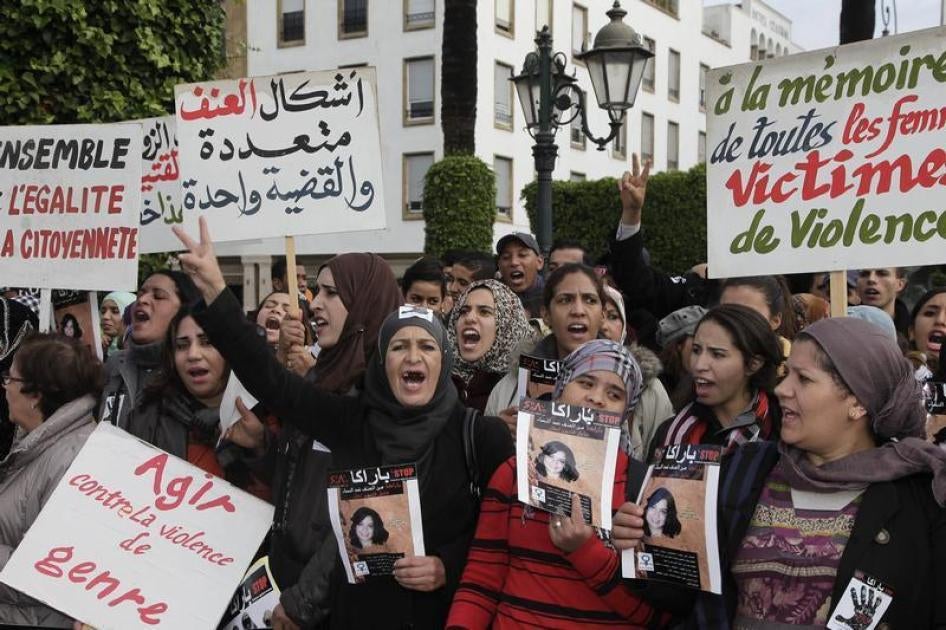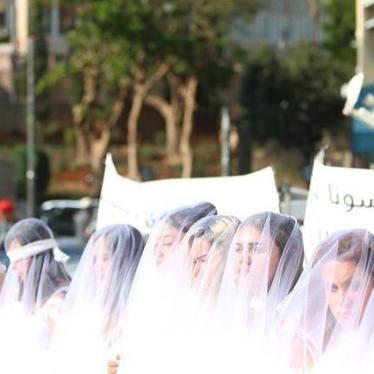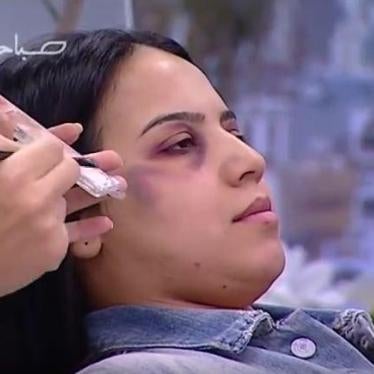A national government survey of women ages 18 to 65 in 2009 found that 62.8 percent had experienced physical, psychological, sexual, and economic violence in Morocco. Of the sample interviewed, 55 percent reported “conjugal” violence and 13.5 percent reported “familial” violence.
Human Rights Watch interviewed 45 people in Morocco, including 20 women and girls who had suffered domestic abuse, in September 2015. They described being punched, kicked, burned, stabbed, or raped, or otherwise abused by their husbands or other family members.
The new law includes positive provisions, such as a definition of violence against women to mean “any act based on gender discrimination that entails physical, psychological, sexual, or economic harm to a woman.” However, it does not provide a definition of domestic violence and does not explicitly criminalize marital rape.
It increases penalties for some forms of violence in the penal code when committed within the family and establishes new crimes including forced marriage, squandering money or property to circumvent payment of maintenance or other dues arising from a divorce, expelling or preventing a spouse from returning home, and sexual harassment in public spaces and cyber harassment.
The law obligates public authorities to take prevention measures, including programs to raise awareness on violence against women. It also provides for specialized units to serve the needs of women and children in courts, government agencies, and security forces, and local, regional, and national committees to address women’s and children’s issues. But Human Rights Watch has documented problems with the few existing units and the law does not include mechanisms to monitor the units or committees, or hold authorities accountable if they fail to carry out their duties.
The new law also has major gaps and flaws that leave women at risk of domestic violence, including a lack of provisions to finance the reforms.
The law allows for protection orders that prohibit an accused person from contacting, approaching, or communicating with the victim. But these can only be issued during a criminal prosecution or after a criminal conviction. Moreover, the orders can be cancelled if spouses reconcile which will only add more pressure on women to drop such orders.
Alternate “protective measures” that “warn” the person not to commit violence or to dispose of joint spousal funds are available, but the law does not specify which authorities would issue them. Violations of protection orders or the “protective measures” can lead to imprisonment or fines.
In the national survey, only 3 percent of women who experienced conjugal violence reported it to the authorities. Most women drop the few criminal cases that are filed as a result of pressure from their or their abuser’s families or because they are financially dependent on their abusers.
Protection orders can be life-saving measures, to prevent further violence and protect the victim such as by prohibiting contact with the victim and removing the attacker from the home.
UN Women has recommended that domestic violence survivors be able to seek protection orders without pursuing other legal proceedings, such as criminal charges or divorce. Civil protection orders are provided in many other countries such as in Lebanon and Tunisia.
Morocco should ensure that domestic violence survivors can access emergency or longer-term protection orders through civil measures, Human Rights Watch said.
Human Rights Watch knows of fewer than 10 shelters in the country that accept domestic violence survivors, and these have limited capacity. Nongovernmental groups operate all of them, but only a few receive any government funding. Many domestic violence survivors are forced to return to abusive partners because they have no means to support or house themselves.
“Access to safe and stable housing is a serious problem for abused women and their children, who are often forced to flee their work and school, become homeless, or return to a violent situation,” said Saida Kouzzi, co-founder of the Moroccan women’s rights organization Mobilising for Rights Associates.
The law also fails to set out concrete duties for police, prosecutors, and other law enforcement and judicial officials in domestic violence cases. Human Rights Watch has interviewed domestic violence survivors who said police officers refused to record their statements, failed to investigate allegations of abuse, and refused to arrest domestic abuse suspects, even with an order from prosecutors. In some cases, police told victims to return to their abusers.
In several cases, public prosecutors did not file charges, but directed the victims to deliver documents to police, directing them to investigate or arrest the abusers. But police often did not follow through, leaving women to go back and forth between the police and prosecutor trying to get help.
The law also fails to provide that courts should consider all forms of evidence in domestic violence cases and that a victim’s court testimony may be sufficient evidence to reach a conviction.
“Few women will be able to get protection from their abusers under this law, as it requires a prosecution and a conviction of their abusers – and yet, little is provided in the law to set out duties of authorities to arrest, prosecute, and convict abusers,” Begum said.
The law also does not provide for financial assistance for survivors or clearly define the government’s role in providing support and services to domestic violence survivors, including for shelter, health services, mental health care, legal advice, and hotlines.
Human Rights Watch wrote to the government in February 2016 and then to House of Councillors in October 2016 with recommendations, including a need to define domestic violence, provide for civil protection orders, set out duties of police and prosecutors, and provide financial assistance and funding of shelters. These were not adopted but the House of Councillors did provide for prevention measures, which Human Rights Watch had also requested.
“Protecting women and girls from domestic violence requires not only legal changes but funding and political support for enforcement and services,” Begum said. “Morocco’s government has taken an initial positive step in adopting this law, but now it should implement it and extend further protections.”









